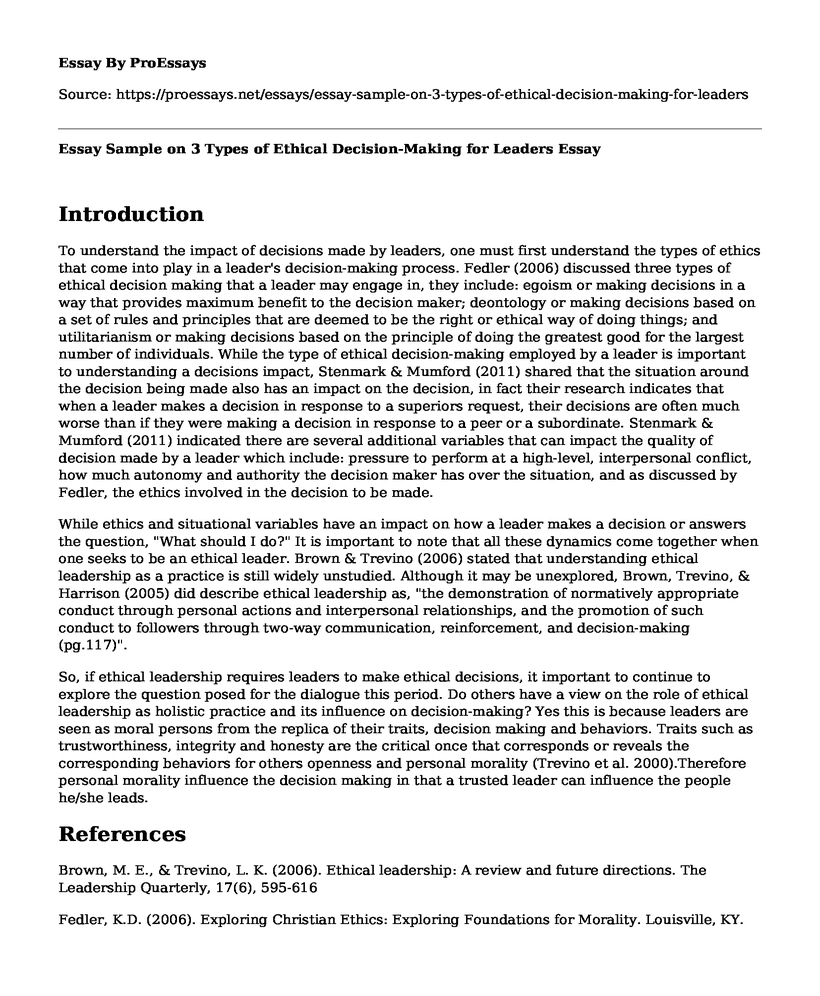Introduction
To understand the impact of decisions made by leaders, one must first understand the types of ethics that come into play in a leader's decision-making process. Fedler (2006) discussed three types of ethical decision making that a leader may engage in, they include: egoism or making decisions in a way that provides maximum benefit to the decision maker; deontology or making decisions based on a set of rules and principles that are deemed to be the right or ethical way of doing things; and utilitarianism or making decisions based on the principle of doing the greatest good for the largest number of individuals. While the type of ethical decision-making employed by a leader is important to understanding a decisions impact, Stenmark & Mumford (2011) shared that the situation around the decision being made also has an impact on the decision, in fact their research indicates that when a leader makes a decision in response to a superiors request, their decisions are often much worse than if they were making a decision in response to a peer or a subordinate. Stenmark & Mumford (2011) indicated there are several additional variables that can impact the quality of decision made by a leader which include: pressure to perform at a high-level, interpersonal conflict, how much autonomy and authority the decision maker has over the situation, and as discussed by Fedler, the ethics involved in the decision to be made.
While ethics and situational variables have an impact on how a leader makes a decision or answers the question, "What should I do?" It is important to note that all these dynamics come together when one seeks to be an ethical leader. Brown & Trevino (2006) stated that understanding ethical leadership as a practice is still widely unstudied. Although it may be unexplored, Brown, Trevino, & Harrison (2005) did describe ethical leadership as, "the demonstration of normatively appropriate conduct through personal actions and interpersonal relationships, and the promotion of such conduct to followers through two-way communication, reinforcement, and decision-making (pg.117)".
So, if ethical leadership requires leaders to make ethical decisions, it important to continue to explore the question posed for the dialogue this period. Do others have a view on the role of ethical leadership as holistic practice and its influence on decision-making? Yes this is because leaders are seen as moral persons from the replica of their traits, decision making and behaviors. Traits such as trustworthiness, integrity and honesty are the critical once that corresponds or reveals the corresponding behaviors for others openness and personal morality (Trevino et al. 2000).Therefore personal morality influence the decision making in that a trusted leader can influence the people he/she leads.
References
Brown, M. E., & Trevino, L. K. (2006). Ethical leadership: A review and future directions. The Leadership Quarterly, 17(6), 595-616
Fedler, K.D. (2006). Exploring Christian Ethics: Exploring Foundations for Morality. Louisville, KY. Westminster John Knox Press
M.E. Brown, L.K. Trevino, & D. Harrison (2005).Ethical leadership: A social learning perspective for construct development and testing.Organizational Behavior and Human Decision Processes, 97 (2005), pp. 117-134
Stenmark, C. K., & Mumford, M. D. (2011). Situational impacts on leader ethical decision-making. The Leadership Quarterly, 22(5), 942-955.
Trevino, L. K., Hartman, L. P., & Brown, M. (2000). Moral person and moral manager: How executives develop a reputation for ethical leadership. California management review, 42(4), 128-142.
Cite this page
Essay Sample on 3 Types of Ethical Decision-Making for Leaders. (2023, Jan 25). Retrieved from https://proessays.net/essays/essay-sample-on-3-types-of-ethical-decision-making-for-leaders
If you are the original author of this essay and no longer wish to have it published on the ProEssays website, please click below to request its removal:
- Chick-n-Gravy Dinner Line Case Study
- Essay Sample on Strategic Management
- Strategic, Operational & Reputational Risks: Evaluating the Technology Project Outcomes
- Transformational Leadership: Enhancing Morals & Ethics in Leadership Training - Essay Sample
- Essay Example on Effective Management Control: Strategies for Sustainability
- Creating a Personalized Leadership System for Optimal Organization Success - Essay Sample
- Paper Example on Network Form & Gender Equity: Examining Life Science Careers







